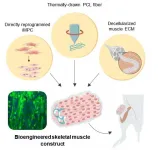(Press-News.org) Young pregnant women, who appear to have fully recovered from an acute injury that reduced their kidney function, have higher rates of significant problems like preeclampsia and low birthweight babies, problems which indicate their kidneys have not actually fully recovered.
Now scientists have developed a rodent model that is enabling studies to better understand, identify and ideally avoid this recently identified association, they report in the Journal of the American Society of Nephrology.
"We are talking about a population of young women that we usually think about as protected and healthy, and they are not if they have had a kidney insult," says Dr. Jennifer C. Sullivan, pharmacologist and physiologist in the Department of Physiology at the Medical College of Georgia and interim dean of The Graduate School at Augusta University. "We think there is injury, potentially even years later, in some of these young women that we are not seeing, and we need to be able to quantify how much injury is still there."
Acute kidney injuries, or AKIs, result from the rapid, temporary loss of adequate oxygen-rich blood to the organ that constantly filters our blood of toxins and resorbs essentials like water, glucose and potassium. An AKI can result from a literal blow to the kidney, like a car accident, from pharmaceuticals like the chemotherapy drug cisplatin, or from a major surgery or sickness that puts you in intensive care, like COVID-19, which is known to have a direct effect on the kidney.
The incidence of AKI has been on the increase, and the COVID pandemic very likely will accelerate that, says Dr. Ellen E. Gillis, senior postdoctoral fellow in Sullivan's lab and the study's corresponding author. A COVID-related AKI is associated with high mortality and considered an independent risk factor for death in patients with COVID. In fact, the clear emerging relationship was the focus of the virtual 25th Consensus Conference of the Acute Disease Quality Initiative.
"Any loss of blood flow to the kidneys can result in reduced function and an AKI," says Gillis. Pregnancy is one of the biggest stressors the kidneys face, she says. "Basically every system in your body changes during pregnancy."
Their new model is helping identify how calamity can occur when the two conditions collide, even if they are separated by years.
During pregnancy, maternal circulation must support fetal circulation so cardiac output increases, total body volume increases as well as plasma volume so the kidneys have an increased load to filter, Gillis says. "There is an increase in plasma volume to ensure the high metabolic demands of both baby and mother are met," Sullivan adds. In this scenario, the baby actually gets preferential protection.
Two recent clinical studies and their new model suggest that even years later, some young women have lingering damage that can prevent these usual responses and protections. It can happen despite the fact that the mother's kidney function appeared normal before pregnancy, including normal creatinine levels, a waste product that healthy kidneys filter from your blood that is measured in the blood and/or urine as a standard assessment of kidney function.
Two clinical studies, one published in 2017 and the second a year later, looked at women an average age of 30, often years out from their AKI with multiple assessments that indicated their kidneys had recovered. The research led by Massachusetts General Hospital found significant increases in problems with both mother and baby, including preeclampsia, low birthweight and loss of the baby.
The MCG scientists now report the same findings in their animal model: they experience an AKI, they recover based on usual measures of kidney function, but problems with the mother and/or baby still occur.
Their model closely mimics what happens in humans: a period of compromised blood flow to the kidney followed by restoration of blood flow, called ischemia reperfusion injury, a known, common cause of AKI in humans, followed by a recovery period in which, again like the young women, creatinine levels returned to normal.
They monitored the rats throughout pregnancy, and watched uterine artery resistance go up, uterine blood flow go down and babies born smaller because they were not getting adequate nutrition. The uterine artery provides most of the blood to the uterus, where the baby develops, and should enlarge significantly during pregnancy.
"Typically during pregnancy your vasculature relaxes and blood pressure decreases to accommodate this increase in plasma volume," Gillis says. "You should see relaxation and vasodilation of the uterine artery," Sullivan adds. Normally there is some new blood vessel growth for the placenta to accommodate the demand, but not in the mother's kidneys. "The kidneys just have to work harder, which normally isn't a problem," Sullivan adds. But the previously injured kidney, which has functioned fine for the woman alone, may not be up for this additional significant task.
"You should see changes in the vasculature to promote increased perfusion, increased delivery to the pups. There are a lot of things that should be happening that the gross measurements we make today suggest aren't happening," Sullivan says.
Rather in their model, and in the young women, pregnancy appears to induce renal insufficiency, driving up levels of creatinine in the blood as well as urea, a byproduct of protein metabolism from your body and the food you eat, whose increased blood levels indicate kidney problems and/or high meat consumption. Creatinine levels should decrease in pregnant women because of that increased plasma volume, but the limited clinical trials have shown they go up in women who have had AKIs.
Plasma volume, which should double, increases some, but not sufficiently, Gillis says. They don't yet know the exact mechanism for why plasma volume increase is insufficient, but suspect it's because the kidneys just can't handle the volume. Sullivan notes there is crosstalk between the kidneys, uterus and placenta that the previous insult to the kidney appears to change. Sodium retention is one way to increase plasma volume, so problems with sodium transport by the kidneys following an AKI could be an issue.
The rat mothers also have more waste product in their blood, another indicator the kidneys are not working at a premium. In fact, the high creatinine levels they are seeing would indicate that pregnancy itself has caused another AKI, Gillis says. The scientists note that it's widely acknowledged that creatinine levels are not an ideal indicator of kidney function, and one of the goals of their work is to find a better biomarker and better treatment.
Gillis is now exploring whether regulatory T cells, which help protect the fetus from the mother's immune system during pregnancy and also should increase in number in pregnancy, are part of the problem. Regulatory T cells can, for example, produce the powerful blood vessel dilator nitric oxide, and they don't see the increase in these calming T cells in their new model. Perhaps the AKI generated an altered inflammatory response that decreases the ability to prompt this important increase in regulatory T cells, Gillis says. If that is the problem, more regulatory T cells, an approach which already has been studied in humans, for example, to better protect their transplanted organ, could be given to help, Sullivan says.
They note that preeclampsia and low birthweight have long been concerns, just not concerns associated with the kidneys. "We thought of them being placental disease," Sullivan says.
Still there have been known overlaps. AKIs increase the risk for chronic kidney disease, women are more likely to get chronic kidney disease and issues occurring during pregnancy may be one of the reasons, they say. Women with poor kidney function are known to have difficulties with pregnancy, but these young women are considered to be recovered from their kidney injury, the scientists emphasize.
And they are concerned the newly discovered association will only increase with rates of both AKI and maternal death on the rise. The Centers for Disease Control and Prevention reports that death rates of pregnant women are on the rise in the United States, which has the highest maternal mortality among developed countries.
COVID could worsen the problem. A study of more than 5,000 veterans hospitalized with COVID, for example, indicated that about 32% developed an AKI and that nearly half of them did not have fully recovered kidney function at discharge from the hospital. Veterans with an AKI were at increased risk of death and Black veterans were at most risk.
The first looks at pregnancy outcomes following what appeared to be full recovery from an AKI was a retrospective study of women who had babies between 1998 and 2016. It found that women who had an AKI had an increased rate of preeclampsia -- the worse the AKI, the greater the preeclampsia risk -- and that their infants were born at an earlier gestational age and were more likely to be small for their gestational age. The emerging association of AKI and preeclampsia and adverse fetal outcomes held even when matched with women of a similar age, race, body mass index and blood pressure -- including rates of preexisting hypertension -- at their first prenatal visit. Creatinine levels the six months before conception also were similar in the nearly 40% of the women on whom that data was available.
Gillis last year received a K99 Pathway to Independence Award from the National Heart, Lung and Blood Institute to develop a model to further explore why pregnant women who seemed to recover from their acute kidney injury, had these associated problems.
Outcomes for an individual with an AKI include hypertension and chronic kidney disease, potentially including the need for kidney dialysis. Preeclampsia is the most common complication of pregnancy and typically occurs in women with a previously healthy blood pressure. Traditional risk factors have actually included not having children as well as obesity and hypertension.
Read the END
New model helping identify pregnant women whose previous kidney injury puts them, babies at risk
2021-02-22
ELSE PRESS RELEASES FROM THIS DATE:
Rapid evolution may help species adapt to climate change and competition
2021-02-22
VANCOUVER, Wash. - Loss of biodiversity in the face of climate change is a growing worldwide concern. Another major factor driving the loss of biodiversity is the establishment of invasive species, which often displace native species. A new study shows that species can adapt rapidly to an invader and that this evolutionary change can affect how they deal with a stressful climate.
"Our results demonstrate that interactions with competitors, including invasive species, can shape a species' evolution in response to climatic change," said co-author Seth Rudman, a WSU Vancouver adjunct professor who will join the faculty as an assistant ...
Music is a must for young drivers, according to Ben-Gurion U. researchers
2021-02-22
BEER-SHEVA, Israel...February 22, 2021 - A new study by Ben-Gurion University of the Negev (BGU) researchers resulted in a nearly unanimous response: driving is "absolutely impossible" without music.
"To young drivers 18-29, music in the car isn't just entertainment, it's part of their autosphere whether they're alone or not," says Prof. Warren Brodsky, director of the BGU Music Science Lab in the Department of the Arts. "They are so used to constant stimulation and absorbing great amounts of information throughout the day, that they don't question how the type of tunes they play might affect concentration, induce aggressive behavior, or cause them to miscalculate risky situations."
"As the fastest growing research university in Israel, BGU provides studies that give us ...
Study of auto recalls shows carmakers delay announcements until they 'hide in the herd'
2021-02-22
BLOOMINGTON, Ind. - Automotive recalls are occurring at record levels, but seem to be announced after inexplicable delays. A research study of 48 years of auto recalls announced in the United States finds carmakers frequently wait to make their announcements until after a competitor issues a recall - even if it is unrelated to similar defects.
This suggests that recall announcements may not be triggered solely by individual firms' product quality defect awareness or concern for the public interest, but may also be influenced by competitor recalls, a phenomenon that no prior research had investigated.
Researchers analyzed 3,117 auto recalls over a 48-year period -- from 1966 to 2013 -- using ...
There is no one-size-fits-all road to sustainability on "Patchwork Earth"
2021-02-22
In a world as diverse as our own, the journey towards a sustainable future will look different depending on where in the world we live, according to a recent paper published in One Earth and led by McGill University, with researchers from the Stockholm Resilience Centre.
"There are many regional pathways to a more sustainable future, but our lack of understanding about how these complex and sometimes contradictory pathways interact (and in particular when they synergize or compete with one another) limits our ability to choose the 'best' ones," says Elena Bennett, a professor in the Department of Natural ...
Low-quality maternal diet during pregnancy may be associated with late-childhood obesity
2021-02-22
Eating a low quality diet, high in foods and food components associated with chronic inflammation, during pregnancy may be associated with an increased risk of obesity and excess body fat in children, especially during late-childhood. The findings are published the open access journal BMC Medicine.
Researchers from University College Dublin, Ireland found that children of mothers who ate a higher quality diet, low in inflammation-associated foods, during pregnancy had a lower risk of obesity and lower body fat levels in late-childhood than children whose mothers ate a lower quality diet, ...
Psychological 'signature' for the extremist mind uncovered by Cambridge researchers
2021-02-22
Researchers have mapped an underlying "psychological signature" for people who are predisposed to holding extreme social, political or religious attitudes, and support violence in the name of ideology.
A new study suggests that a particular mix of personality traits and unconscious cognition - the ways our brains take in basic information - is a strong predictor for extremist views across a range of beliefs, including nationalism and religious fervour.
These mental characteristics include poorer working memory and slower "perceptual strategies" - the unconscious processing of changing stimuli, such as shape and colour - as well as tendencies towards impulsivity and sensation seeking.
This combination of cognitive and ...
Investment needed to bring down pancreatic cancer death rates in Europe
2021-02-22
Researchers have called on European policymakers to make adequate resources available to tackle pancreatic cancer, a disease that is almost invariably fatal and where little progress has been made over the past 40 years.
In the latest predictions for cancer deaths in the EU and UK for 2021, published in the leading cancer journal Annals of Oncology [1] today (Monday), researchers led by Carlo La Vecchia (MD), a professor at the University of Milan (Italy), say that pancreatic death rates are predicted to remain approximately stable for men, but continue to rise in women in most EU countries.
The researchers predict that ...
Pioneering research reveals gardens are secret powerhouse for pollinators
2021-02-22
Home gardens are by far the biggest source of food for pollinating insects, including bees and wasps, in cities and towns, according to new research.
The study, led by the University of Bristol and published today in the Journal of Ecology, measured for the first time how much nectar is produced in urban areas and discovered residential gardens accounted for the vast majority - some 85 per cent on average.
Results showed three gardens generated daily on average around a teaspoon of Nature's ambrosia, the unique sugar-rich liquid found in flowers which pollinators drink for energy. While a teaspoon ...
Bioengineered hybrid muscle fiber for regenerative medicine
2021-02-22
Muscle is the largest organ that accounts for 40% of body mass and plays an essential role in maintaining our lives. Muscle tissue is notable for its unique ability for spontaneous regeneration. However, in serious injuries such as those sustained in car accidents or tumor resection which results in a volumetric muscle loss (VML), the muscle's ability to recover is greatly diminished. Currently, VML treatments comprise surgical interventions with autologous muscle flaps or grafts accompanied by physical therapy. However, surgical procedures often lead to a reduced muscular function, and in some cases result in a complete graft failure. Thus, there is a demand for additional therapeutic options to improve muscle loss recovery.
A promising strategy to improve ...
Colorful connection found in coral's ability to survive higher temperatures
2021-02-21
Coral within the family Acropora are fast growers and thus important for reef growth, island formation, and coastal protection but, due to global environmental pressures, are in decline
A species within this family has three different color morphs - brown, yellow-green, and purple, which appear to respond differently to high temperatures
Researchers looked at the different proteins expressed by the different color morphs, to see whether these were related to their resilience to a changing environment
The green variant was found to maintain high levels of green fluorescent proteins during summer heatwaves and was less likely to bleach than the other two morphs
This suggest that resistance to thermal stress is influenced by a coral's underlying genetics, ...






